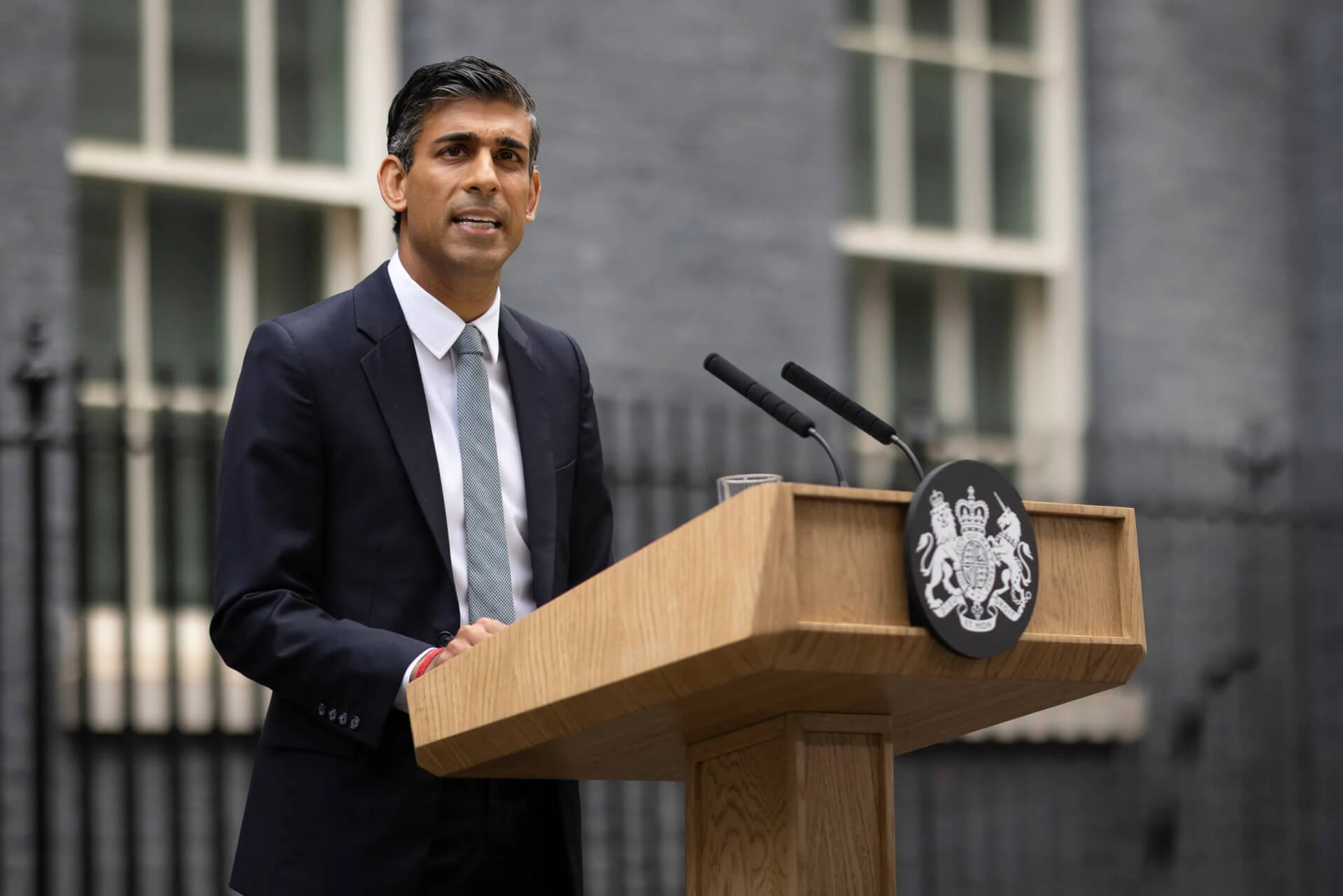During a foreign policy address at the annual Lord Mayor’s Banquet in London yesterday, British Prime Minister (PM) Rishi Sunak affirmed that the United Kingdom (UK) will not align itself with the European Union (EU) and underscored that the “golden era” of friendship with China is now over.
He stressed that while his administration will look to ‘reinvigorate’ ties and foster “collective resilience” with EU partners on “strategic vulnerabilities” such as security, energy cooperation, and illegal migration in the post-Brexit era, “under my leadership we’ll never align with EU law.”
The British leader then took aim at China’s policy of “conspicuously competing for global influence using all the levers of state power.” In this regard, Sunak said he will take a “longer-term view” to strengthen the UK’s “resilience” and protect its “economic security.”
He declared, “Let’s be clear, the so-called ‘golden era’ is over, along with the naïve idea that trade would automatically lead to social and political reform.”
Honoured to attend the Lord Mayor’s Banquet for @citylordmayor @cityoflondon
— James Thomson (@JMDT999) November 29, 2022
Strong policy speech by @RishiSunak @10DowningStreet
Great to meet Commissioner Sir Mark Rowley @metpoliceuk & Sir Mike Wigston @ChiefofAirStaff pic.twitter.com/U8WTEIz06p
He opined that Chinese authoritarianism poses a “systemic challenge” to the UK’s values and interests. To this end, he regretted the ongoing crackdown by the Chinese government against protestors opposing the COVID-19 restrictions, along with human rights abuses in Xinjiang and Hong Kong.
Sunak also emphasised the importance of recognising China’s destabilising role in the global economy and issues like climate change.
Furthermore, he applauded the introduction of the National Security and Investment Act, which allowed the government to block China-owned Nexperia’s $76 million deal to purchase the Newport Wafer Fab earlier this month.
The British government also directed Nexperia to sell at least 86% of its stake in Newport Wafer Fab, Britain’s biggest microchip factory.
We believe in freedom 🇺🇦🇬🇧 pic.twitter.com/YT4GrbE7A0
— Rishi Sunak (@RishiSunak) November 27, 2022
Sunak also vowed to ‘defend democracy,’ saying this vision is shared both by the government and by the citizenry at large, assuring that these values are “constant” and “set in stone” despite the “intensifying” changes in the world.
He pointed to how the UK has welcomed refugees from Hong Kong, Afghanistan, and Ukraine. He stressed the UK would provide resources and ingenuity to protect communities being attacked by non-democratic regimes.
Despite singling out Russia for its violation of international law and China for its human rights abuses, the PM stressed that the Cold War approach of bloc politics will not work. He underscored the need to protect and cultivate friendships with countries in the Commonwealth, the Gulf, and the Indo-Pacific.
Words are not enough.
— James Cleverly🇬🇧 (@JamesCleverly) November 25, 2022
Words won't keep the lights on this winter. Words won't defend against Russian missiles.
The UK isn't just talking about Ukraine, we're providing concrete support for the defence of Ukraine.
Thank you @DmytroKuleba for welcoming me to Kyiv. pic.twitter.com/3LdgnXJKwo
For instance, he pointed to the “collective resolve” seen during the Ukraine war, as evidenced by Sweden and Finland’s bids to join the North Atlantic Treaty Organization, Germany increasing defence spending, and the support of countries such as Australia, Japan, and South Korea.
The British leader vowed to protect Ukraine “for as long as it takes” and said he would provide new military equipment to enhance Kyiv’s air defence capabilities, which will, in turn, help protect civilians and other strategic infrastructure.
Regarding defence cooperation, he said initiatives such as AUKUS with Australia and the United States, the Future Combat Air System with Italy and Japan, and the Five Power Defence Arrangements with Australia, Malaysia, New Zealand and Singapore will be key in “supporting security and prosperity - both at home and in our European neighbourhood and in the Indo-Pacific.”
LIVE NOW: My plan for a stronger economy @CBItweets https://t.co/tnKXaXztTO
— Rishi Sunak (@RishiSunak) November 21, 2022
On the trade front, he said the UK will strengthen its push for new trade deals and to join existing trade blocs such as the Comprehensive and Progressive Agreement for Trans-Pacific Partnership. He said free trade agreements with India and Indonesia are also high on the agenda, noting that 60% of global trade passes through the Indo-Pacific, which will account for over half of global growth by 2050.
Sunak concluded his speech that under his leadership, the UK will not “choose the status quo” and will “do things differently,” while also remaining committed to the “enduring belief in freedom, openness, and the rule of law.”

